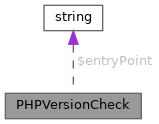
Public Member Functions | |
| checkExtensionExistence () | |
| Displays an error, if a PHP extension does not exist. | |
| checkRequiredPHPVersion () | |
| Displays an error, if the installed php version does not meet the minimum requirement. | |
| checkVendorExistence () | |
| Displays an error, if the vendor/autoload.php file could not be found. | |
| getIndexErrorOutput ( $title, $longHtml, $shortText) | |
| Returns an error page, which is suitable for output to the end user via a web browser. | |
| getPHPInfo ( $impl=false) | |
| Returns the version of the installed php implementation. | |
| outputHTMLHeader () | |
| Output headers that prevents error pages to be cached. | |
| setEntryPoint ( $entryPoint) | |
| triggerError ( $title, $shortText, $longText, $longHtml) | |
| Display something vaguely comprehensible in the event of a totally unrecoverable error. | |
Public Attributes | |
| string | $entryPoint = null |
| Which entry point we are protecting. | |
| $functionsExtensionsMapping | |
| $mwVersion = '1.30' | |
Detailed Description
Definition at line 30 of file PHPVersionCheck.php.
Member Function Documentation
◆ checkExtensionExistence()
| PHPVersionCheck::checkExtensionExistence | ( | ) |
Displays an error, if a PHP extension does not exist.
- Returns
- $this
Definition at line 183 of file PHPVersionCheck.php.
References $ext, are, array(), as, PHP, that, and triggerError().
◆ checkRequiredPHPVersion()
| PHPVersionCheck::checkRequiredPHPVersion | ( | ) |
◆ checkVendorExistence()
| PHPVersionCheck::checkVendorExistence | ( | ) |
Displays an error, if the vendor/autoload.php file could not be found.
- Returns
- $this
Definition at line 157 of file PHPVersionCheck.php.
References from, href, on, or, see, some, that, and triggerError().
◆ getIndexErrorOutput()
| PHPVersionCheck::getIndexErrorOutput | ( | $title, | |
| $longHtml, | |||
| $shortText | |||
| ) |
Returns an error page, which is suitable for output to the end user via a web browser.
- Parameters
-
string $title string $longHtml string $shortText
- Returns
- string
Definition at line 239 of file PHPVersionCheck.php.
References $title, color, error, style, text, and title.
Referenced by triggerError().
◆ getPHPInfo()
| PHPVersionCheck::getPHPInfo | ( | $impl = false | ) |
Returns the version of the installed php implementation.
- Parameters
-
string $impl By default, the function returns the info of the currently installed PHP implementation. Using this parameter the caller can decide, what version info will be returned. Valid values: HHVM, PHP
- Returns
- array An array of information about the php implementation, containing:
- 'version': The version of the php implementation (specific to the implementation, not the version of the implemented php version)
- 'implementation': The name of the implementation used
- 'vendor': The development group, vendor or developer of the implementation.
- 'upstreamSupported': The minimum version of the implementation supported by the named vendor.
- 'minSupported': The minimum version supported by MediWiki
- 'upgradeURL': The URL to the website of the implementation that contains upgrade/installation instructions.
Definition at line 81 of file PHPVersionCheck.php.
References array().
Referenced by checkRequiredPHPVersion().
◆ outputHTMLHeader()
| PHPVersionCheck::outputHTMLHeader | ( | ) |
Output headers that prevents error pages to be cached.
Definition at line 222 of file PHPVersionCheck.php.
Referenced by triggerError().
◆ setEntryPoint()
| PHPVersionCheck::setEntryPoint | ( | $entryPoint | ) |
- Parameters
-
string $entryPoint Which entry point we are protecting. One of: - index.php
- load.php
- api.php
- mw-config/index.php
- cli
- Returns
- $this
Definition at line 61 of file PHPVersionCheck.php.
References $entryPoint.
◆ triggerError()
| PHPVersionCheck::triggerError | ( | $title, | |
| $shortText, | |||
| $longText, | |||
| $longHtml | |||
| ) |
Display something vaguely comprehensible in the event of a totally unrecoverable error.
Does not assume access to anything; no globals, no autoloader, no database, no localisation. Safe for PHP4 (and putting this here means that WebStart.php and GlobalSettings.php no longer need to be).
Calling this function kills execution immediately.
- Parameters
-
string $title HTML code to be put within an tag @param string $shortText @param string $longText @param string $longHtml
Definition at line 311 of file PHPVersionCheck.php.
References $title, getIndexErrorOutput(), and outputHTMLHeader().
Referenced by checkExtensionExistence(), checkRequiredPHPVersion(), and checkVendorExistence().
Member Data Documentation
◆ $entryPoint
| string PHPVersionCheck::$entryPoint = null |
Which entry point we are protecting.
One of:
- index.php
- load.php
- api.php
- mw-config/index.php
- cli
Definition at line 50 of file PHPVersionCheck.php.
Referenced by setEntryPoint().
◆ $functionsExtensionsMapping
| PHPVersionCheck::$functionsExtensionsMapping |
Definition at line 33 of file PHPVersionCheck.php.
◆ $mwVersion
| PHPVersionCheck::$mwVersion = '1.30' |
Definition at line 32 of file PHPVersionCheck.php.
The documentation for this class was generated from the following file:
- includes/PHPVersionCheck.php